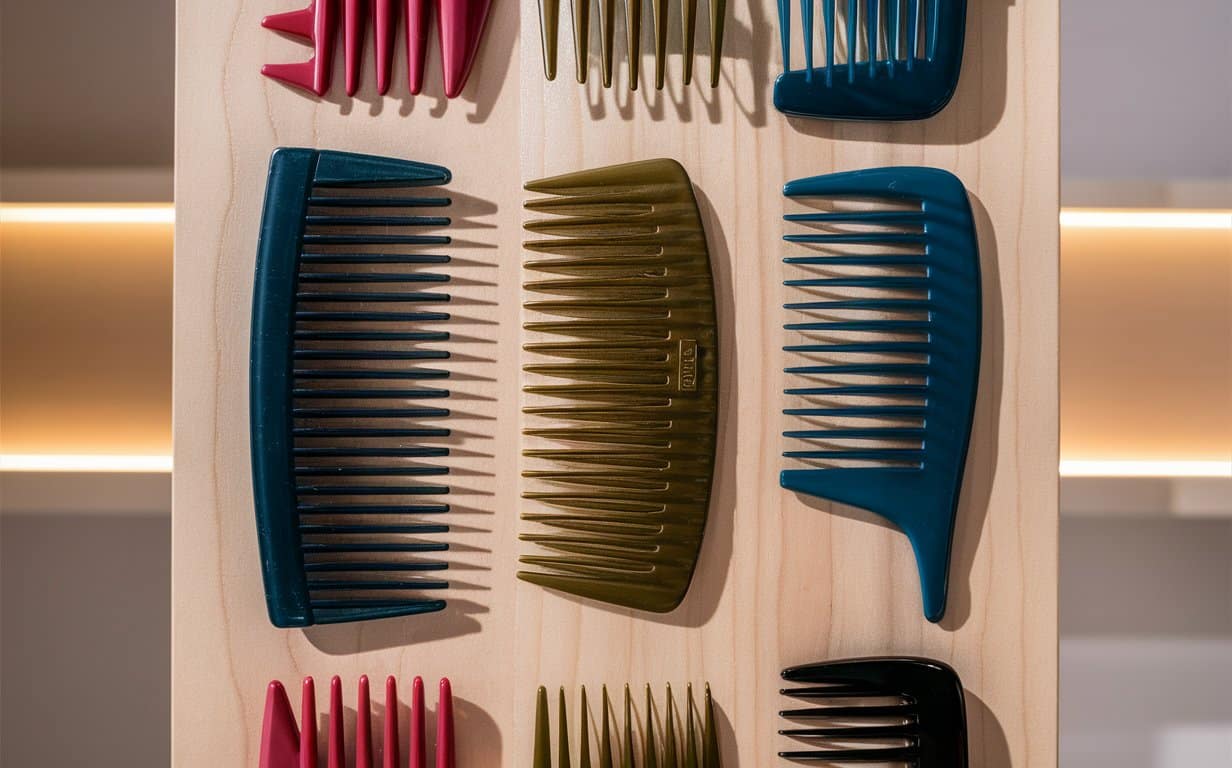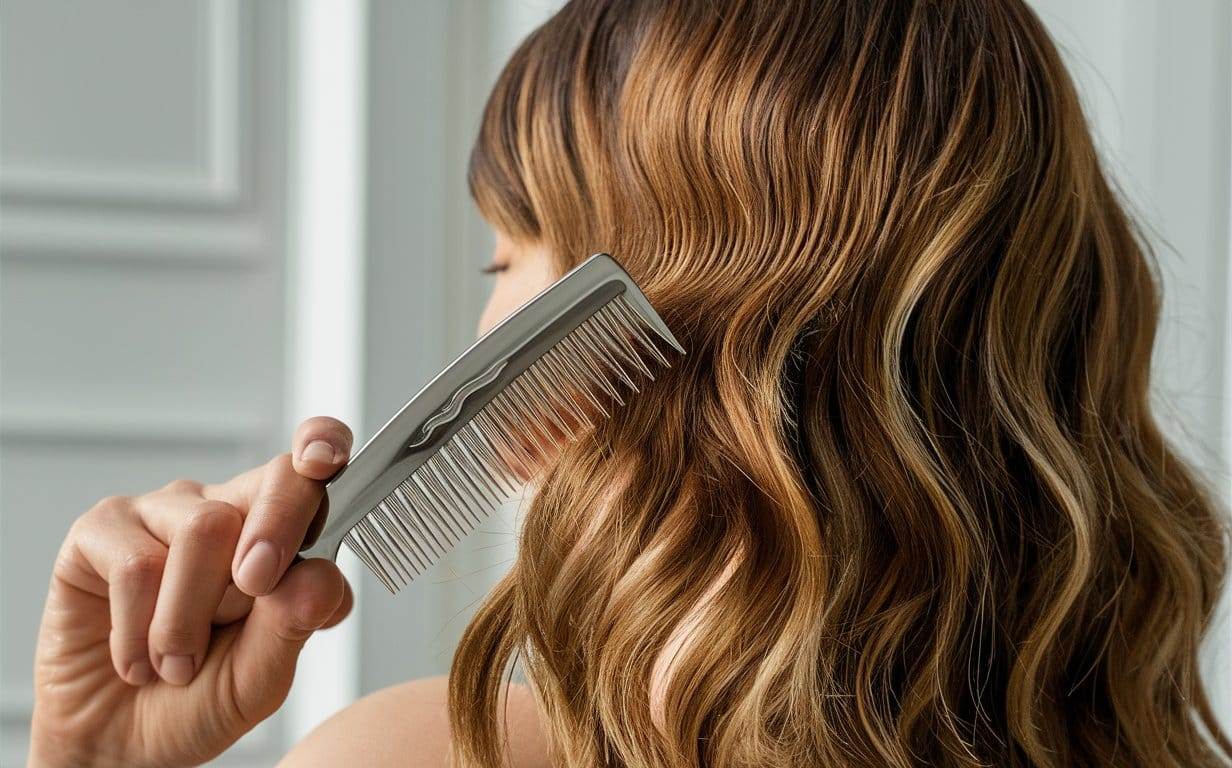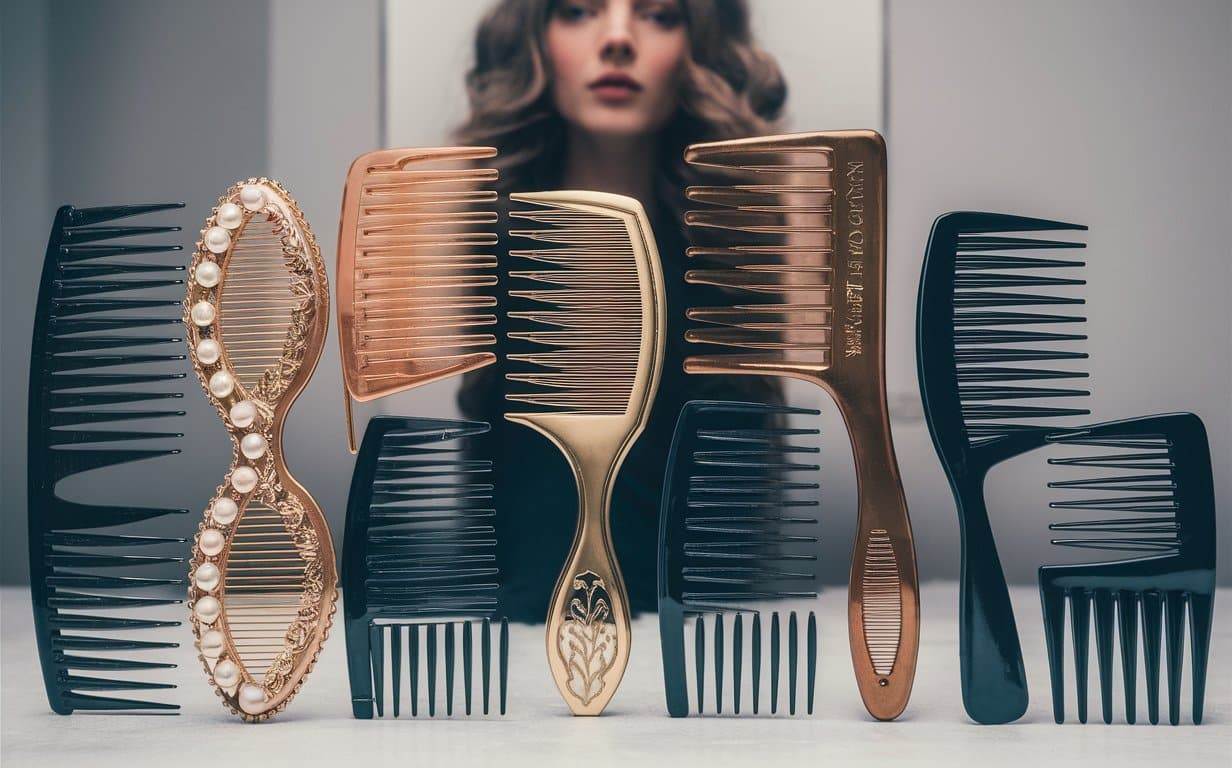Discover the best types of combs for wavy and frizzy hair to bring out your natural waves or manage frizz effortlessly. This guide covers everything from the best brush for frizzy hair to specific combs for wavy hair, ensuring you style your hair with ease.
Understanding Wavy and Frizzy Hair
Characteristics of Wavy and Frizzy Hair
Natural Wave Patterns
Wavy hair comes in different patterns, from loose waves to tighter S-shaped curls. These patterns can vary a lot from person to person. Factors like genetics and how you take care of your hair play a big role in what your waves look like. Knowing your wave pattern helps you choose the right products and routines.
Tendency Towards Frizz
Wavy hair often frizzes up more easily because of its structure. The bends and curves in wavy hair make it soak up moisture from the air, leading to frizz. Humidity makes this worse by causing the hair cuticle to swell, making it look messy.
Common Challenges for Wavy Hair
People with wavy hair face problems like uneven curls, flat roots, and trouble keeping their waves defined. To handle these issues, use products made for wavy hair and techniques that enhance your natural waves without causing damage.
Common Challenges for Frizzy Hair
Frizzy hair has its own set of problems like dryness, lack of shine, and tangling. This type of hair needs lots of moisture treatments and anti-frizz products to stay smooth and manageable. Regular trims also help prevent split ends that can make frizz worse.
Factors Influencing Hair Texture
Genetics and Hair Type
Genetics are a big factor in determining your hair texture. The shape of your follicles decides if your hair is straight, wavy, or curly. Your genes also affect how thick or dense your strands are, which impacts how you should care for them.
Environmental Factors
Things like humidity, temperature changes, and pollution can really affect wavy and frizzy hair. High humidity causes the cuticle to open up and absorb moisture from the air, making frizz worse. Pollution can weaken the hair shaft over time too.
Hair Care Routine Impact
Your daily routine has a huge impact on wavy and frizzy hair texture. Using sulfate-free shampoos helps keep natural oils in your scalp healthy. Deep conditioning treatments improve moisture retention while avoiding heat styling tools minimizes damage that leads to frizz.
Importance of the Right Comb for Wavy and Frizzy Hair
Benefits of Using the Correct Comb
Using the right comb for wavy or frizzy hair has many benefits. Wide-tooth combs are great because they help detangle without breaking delicate strands. They also spread conditioner evenly during showers, making sure each strand gets hydrated.
Common Mistakes When Choosing Combs
A common mistake is picking fine-tooth combs that aren’t good for wavy or frizzy textures. Fine-tooth combs can break both types of locks by pulling too hard on knots instead of gently working them out.
How Hair Density Affects Your Choice
Thick Hair Needs
If you have thick-haired textures, go for wide-tooth combs made from strong materials like wood or hard plastic. These provide better control during detangling sessions without putting too much strain on individual strands.
Fine Hair Considerations
For those with fine-haired textures, look for lightweight combs with flexible bristles that not only detangle but also add volume at the roots without creating static electricity often caused by plastic tools.
Types of Combs for Wavy Hair
Wide-Tooth Combs
Wide-tooth combs are a must-have for wavy hair. These combs have teeth that are far apart, making them great for detangling without breaking your hair. They are often seen as the best comb for wavy hair because they move through your strands gently, helping to keep your natural wave pattern.
When using a wide-tooth comb, start at the ends of your hair and work your way up to the roots. This method helps reduce tangles and makes detangling easier. Wide-tooth combs are also perfect detangling tools for wet hair since they can handle knots without pulling or tugging too much.
Detangling Combs
Detangling combs are made to deal with knots and tangles easily. These combs usually have flexible bristles that move with your hair, protecting your scalp while you detangle. They help control frizz and can be used on both wet and dry hair.
For the best results, use a detangling comb after applying a leave-in conditioner or detangling spray. This will help the comb slide through your hair more smoothly, removing knots without causing frizz or breakage.
Boar Bristle Combs
Boar bristle brushes are made from natural fibers and are known for spreading natural oils from your scalp throughout your hair. This helps keep your scalp healthy and gives wavy hair a glossy finish.
Using a boar bristle brush regularly can improve the texture of your waves by evenly spreading oil, which adds shine and reduces dryness. It’s especially good for those who want to enhance their natural wave pattern while keeping their scalp in good shape.
Specialty and Hybrid Combs
Specialty and hybrid combs offer unique solutions for various hair care needs. Multi-purpose combs often come with features like an ergonomic handle or anti-static properties, making them versatile tools in your grooming kit.
These combs are designed to meet specific needs such as reducing static electricity in your hair or providing an easier grip during styling sessions. They combine multiple functions into one tool, making them convenient options if you’re looking to simplify your hair care routine.
By knowing about different types of combs available for wavy hair, you can pick the right tools that suit what you need, ensuring that your waves stay healthy, shiny, and well-defined.

Choosing the Best Brush for Wavy Frizzy Hair
Types of Brushes- A Comprehensive Guide
When it comes to managing wavy, frizzy hair, choosing the right brush is essential. Different types of brushes serve various purposes and can significantly impact your hair’s health and appearance.
- Paddle Brushes for Wavy Hair: Paddle brushes are ideal for detangling and smoothing wavy hair. Their wide, flat surface allows you to cover more area with each stroke, reducing frizz and making your hair more manageable.
- Round Hair Brushes: Round brushes are perfect for adding volume and creating curls or waves. They come in various sizes; smaller ones are great for tighter curls, while larger ones help achieve loose waves and added volume.
- Bristle Material for Combs: The material of the bristles plays a crucial role in how a brush interacts with your hair. Natural bristles, like boar bristles, help distribute natural oils from your scalp down to the ends of your hair, reducing frizz and adding shine. Synthetic bristles can be more durable but might not offer the same benefits as natural ones.
- Brush Size for Wavy Hair: The size of the brush matters depending on what you’re trying to achieve. Larger brushes are better for smoothing and straightening, while smaller brushes can help define curls and add texture.
- Handle Comfort and Grip: A comfortable handle with a good grip makes brushing easier and less tiring. Look for ergonomically designed handles that fit well in your hand.
By considering these factors, you can manage frizz better, distribute natural oils evenly to prevent breakage, and enhance the volume and texture of your wavy hair.
Factors to Consider When Choosing a Brush
Selecting the right brush involves several considerations that affect both functionality and long-term use.
- Bristle Material for Combs: Natural bristles like boar bristles are gentle on the scalp and excellent at distributing natural oils through your hair. This helps reduce frizz and adds shine. On the other hand, synthetic bristles are more durable but may not provide the same level of care as natural ones.
- Brush Size for Wavy Hair: The size of the brush should match your styling needs. Larger brushes work well for straightening or smoothing large sections of hair quickly, while smaller brushes are ideal for detailed work like defining curls or adding volume at the roots.
- Handle Comfort and Grip: A comfortable handle with a non-slip grip is essential for ease of use. Ergonomically designed handles reduce hand fatigue during prolonged brushing sessions.
- Price and Durability: Investing in a high-quality brush can save money in the long run by reducing damage to your hair. Durable brushes made from quality materials tend to last longer and maintain their effectiveness over time.
Considering these factors ensures you choose a brush that meets your styling needs while promoting healthy hair practices.
How Different Brushes Affect Hair Health
Using different types of brushes can have varied impacts on your overall hair health. Here’s how:
- Protecting Hair from Damage: Using a paddle brush with natural bristles helps minimize friction between the brush and your hair strands. This reduces breakage during detangling sessions.
- Reducing Breakage and Split Ends: Round brushes with smooth bristle tips prevent snagging on individual hairs, which helps reduce split ends over time. Proper brushing techniques also play a vital role—always start from the ends working up towards roots to avoid unnecessary pulling on tangles.
Proper brushing not only keeps wavy frizzy hair manageable but also promotes healthier growth by stimulating blood flow to the scalp through gentle massaging actions performed during brushing sessions.

Proper Brushing Techniques for Wavy Frizzy Hair
Preparing Your Hair for Brushing
Getting your hair ready before brushing is super important, especially if it’s wavy and frizzy. Start with pre-brushing treatments like leave-in conditioners. These products hydrate your hair, making it easier to manage and less prone to frizz.
Hair masks are also a great option. Use them once or twice a week for deep conditioning. Look for hydrating products with natural oils like argan or coconut oil.
When it comes to detangling, the right tools make a big difference. Use wide-tooth combs or special detangling brushes designed for wavy and frizzy hair. Always start at the ends of your hair and work your way up to avoid breakage.
Step-by-Step Brushing Guide
Brushing wavy and frizzy hair needs a careful approach. Here’s how you can do it:
- Start with Wet Hair: Gently detangle wet hair using a wide-tooth comb.
- Apply Leave-In Conditioner: This helps smooth out the strands.
- Begin from the Ends: Start brushing from the ends of your hair, moving upwards towards the roots.
- Use Gentle Strokes: Avoid harsh brushing to prevent breakage.
- Brush Frequency: Brush your hair 2-3 times a week to avoid over-manipulation.
- Scalp Health: Use a brush designed for scalp health to boost blood circulation.
Following these steps will help you keep your wavy locks healthy without causing damage.
Post-Brushing Hair Care
After brushing, it’s key to maintain moisture and shine in your wavy, frizzy hair. Using leave-in conditioners and serums can lock in hydration and keep frizz under control. Choose anti-frizz products made specifically for wavy hair types.
Another essential step is distributing natural oils throughout your hair after brushing. You can do this by gently running your fingers from the scalp down to the tips, ensuring even oil distribution which adds shine and reduces dryness.
Expert Tips for Managing Frizz
Managing frizz while combing wavy hair can be tricky but doable with these tips:
- Preventing Frizz While Combing: Always use a wide-tooth comb or a special frizz control comb when detangling.
- Best Products After Brushing: Opt for lightweight serums or creams that seal moisture without weighing down your waves.
- Humidity-Proof Products: Use humidity-proof products during damp weather conditions to keep frizz at bay.
Avoid common mistakes like over-brushing or using harsh tools that can worsen frizziness. Stick to gentle techniques and suitable products recommended by experts for best results.
By following these guidelines, you’ll effectively manage wavy, frizzy hair while keeping it healthy and beautiful all day long!

